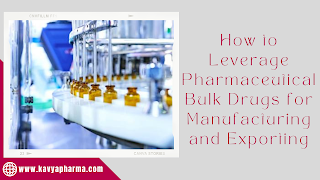Introduction
The dynamic landscape of the pharmaceutical industry, the role of Pharmaceutical Bulk Drugs Manufacturers, Exporters, and Suppliers is paramount. These entities form the backbone of the pharmaceutical supply chain, ensuring a steady flow of essential active pharmaceutical ingredients (APIs) to create life-saving medications. This blog delves into the critical functions and significance of these players in the pharmaceutical ecosystem.
Manufacturing Excellence: Crafting the Building Blocks
Pharmaceutical Bulk Drug Manufacturers are the cornerstone of drug development. They are responsible for producing the raw materials, often referred to as active pharmaceutical ingredients (APIs), that form the foundation of various medicines. The manufacturing process involves complex chemical and biochemical procedures to synthesize these APIs to meet the stringent quality and safety standards set by regulatory authorities. Precision and adherence to Good Manufacturing Practices (GMP) are non-negotiable. Stringent quality control measures, robust testing protocols, and state-of-the-art equipment are essential to ensure the purity, potency, and safety of the produced bulk drugs.
Global Reach: The Role of Exporters
In an interconnected world, pharmaceutical exporters play a pivotal role in distributing these bulk drugs to different corners of the globe. These entities facilitate the movement of APIs from their country of origin to pharmaceutical companies, contract manufacturers, and formulators worldwide.
Exporters must navigate intricate regulatory frameworks, customs procedures, and quality compliance standards to ensure that the bulk drugs reach their destination intact and within the specified timelines. Furthermore, exporters often act as intermediaries between manufacturers and international buyers, offering expertise in logistics, documentation, and regulatory affairs.
Seamless Supply Chain: Suppliers' Contribution
The pharmaceutical supply chain is a delicate balance of demand and supply. Pharmaceutical Bulk Drug Suppliers play a crucial role in maintaining this equilibrium. They ensure a consistent supply of bulk drugs to pharmaceutical companies, allowing them to focus on formulation and production without worrying about disruptions in their supply chain.
Suppliers collaborate closely with manufacturers to understand production schedules, inventory levels, and market demand. This collaboration is essential to prevent shortages or overages that could lead to production delays or excess inventory costs. As supply chain partners, suppliers help pharmaceutical companies optimize their operations and minimize risks.
Navigating Challenges: Regulatory Compliance
For Pharmaceutical Bulk Drugs Manufacturers, Exporters, and Suppliers, regulatory compliance is not just a buzzword; it's a way of life. The pharmaceutical industry is governed by a multitude of regulations and standards to ensure the safety, efficacy, and quality of medications. These entities must stay abreast of evolving regulations, adapt their processes, and invest in continuous improvement to meet the ever-changing compliance landscape. Global harmonization efforts, such as the International Council for Harmonisation of Technical Requirements for Pharmaceuticals for Human Use (ICH), aim to streamline regulations and guidelines across different regions, making it easier for manufacturers, exporters, and suppliers to navigate the complexities of international trade.
Innovation and Sustainability: The Way Forward
As the pharmaceutical industry advances, so does the role of Pharmaceutical Bulk Drugs Manufacturers, Exporters, and Suppliers. Innovation is key to developing more efficient and sustainable manufacturing processes, reducing environmental impact, and enhancing the quality of bulk drugs. Continuous research and development efforts are essential to discover novel synthetic routes, improve yield, and reduce waste. The carbon footprint of pharmaceutical production are becoming increasingly important. Manufacturers, exporters, and suppliers are exploring eco-friendly technologies and green initiatives to contribute to a healthier planet while meeting the ever-growing global demand for pharmaceuticals.
Conclusion,
The world of Pharmaceutical Bulk Drugs Manufacturers, Exporters, and Suppliers is a crucial linchpin in the pharmaceutical industry. Their role in manufacturing high-quality bulk drugs, ensuring global distribution, and maintaining a seamless supply chain cannot be understated. As technology advances and regulatory landscapes evolve, these entities must continue to adapt, innovate, and collaborate to shape the future of pharmaceuticals and improve global healthcare outcomes.

Thanks for explaining about how to leverage pharmaceutical. Pharmaceutical firms play an important role in assisting patients and communities. You can also check out about pharma product manufacturing here.
ReplyDeleteThey are in charge of creating the raw materials—also known as active pharmaceutical ingredients, or APIs—that serve as the basis for a variety of medications. You can also check out about pharma product manufacturing here.
ReplyDelete